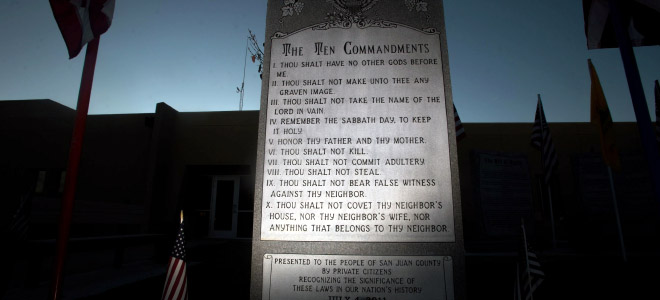
Today, ADF has asked the U.S. Supreme Court to hear the case of City of Bloomfield v. Felix, involving whether the city may allow private individuals to fund and construct certain historical monuments, like the Ten Commandments, on public land.
Since 2007, Bloomfield, New Mexico has permitted local citizens to finance the construction of various historical monuments on its city hall lawn. The monuments commemorate key texts, and affirm the historical influence of these texts on the United States.
In this public venue, a group of citizens chose to fund a Ten Commandments monument to stand alongside other commemorations of important documents, like the Bill of Rights, the Declaration of Independence, and the Gettysburg Address. Bloomfield allows the city hall lawn to be used as a forum so that local residents may, on their own time and with their own money, commemorate history.
No public funds were used to install the monuments, but the ACLU eventually filed suit on behalf of two local residents anyway, claiming that the Ten Commandments monument was unconstitutional. The U.S. Court of Appeals for the Tenth Circuit ruled in favor of the ACLU’s position.
Is there even a case?
In order for a case to proceed in court, the plaintiff must demonstrate that they are being harmed in some way. In the law, that is called establishing standing. Here, the two individuals in the lawsuit, Jane Felix and B.N. Coone, contend that the City of Bloomfield is actually injuring them by allowing the display in a public place. The Tenth Circuit’s decision notes that:
Felix stopped going to City Hall to pay her water bills so she could avoid the Monument, but still sees it from the road five or six times a week. Coone drives past the Monument three or four times a week and sees it up-close every month when he goes to pay his water bill. That kind of exposure is more than enough for standing.
But it isn’t. One’s disagreement with the words of a particular text does not establish standing. The plaintiffs are not required to read, or assent to, the text of the monument. Indeed, if standing could be obtained merely by viewing something in a public space with which one disagrees, the courts would be quite busy!


